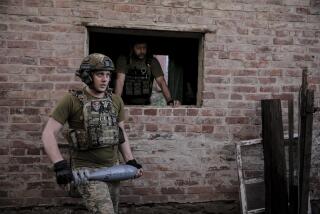Editorial: Why are we back in Iraq?
- Share via
In authorizing airstrikes against targets in northern Iraq, President Obama pointed to what anyone would agree was savage behavior by the so-called Islamic State, whose fighters have dispossessed and threatened with extinction innocent Iraqis they regard as infidels. But Obama shouldn’t allow what he described as an emergency intervention for humanitarian purposes to mutate into a major military campaign.
In recent weeks the Islamic State, an offshoot of Al Qaeda that is also active in Syria, has terrorized Christians in Mosul, Iraq’s second-largest city, threatened the semiautonomous Kurdish region and driven thousands of members of the Yazidi religious minority into a mountainous area where they faced starvation. On Thursday, Obama announced that U.S. aircraft were dropping food and water for the refugees and that he had authorized airstrikes to “break the siege of Mt. Sinjar and protect the civilians trapped there.” On Friday, two F/A-18 fighters dropped 500-pound laser-guided bombs on a mobile artillery target near Irbil; later, four F/A-18s hit a convoy of seven vehicles. On Saturday, Obama suggested that military action could continue for a while, saying, “I don’t think we’re going to solve this problem in weeks.”
Obama identified two compelling reasons for taking action in a country from which the U.S. withdrew troops in 2011 after eight years and almost 4,500 U.S. military fatalities. First, he cited the responsibility of the U.S. to intervene “when we have the unique capabilities to help avert a massacre.” His other justification was the need to protect American civilians and military advisors in Irbil. Obama insisted the operation was a limited one and promised he wouldn’t let the U.S. “be dragged into fighting another war in Iraq.” Instead, the U.S. would continue to press for a broad-based government in Baghdad and work with Iraq and its neighbors “to deal with this humanitarian crisis and counter-terrorism challenge.”
We don’t doubt that the president was moved by the suffering the Islamic State has inflicted on the Yazidis and other victims. But the airstrikes can also be interpreted as an attempt to shore up the government of Iraq against an insurgency that Shiite Prime Minister Nouri Maliki has helped to foment by excluding Sunnis from the political process. And the president’s other rationale for the airstrikes — to protect Americans — also would justify military action to protect U.S. personnel from an attack on Baghdad. Will the U.S. be able to say no if the Islamic State continues to advance and Maliki or a successor asks for additional airstrikes — or more military advisors? And what if those measures proved unavailing?
When Obama announced in June that he was considering “all options” to help the government in Baghdad fend off the Islamic State insurgency, we argued against a U.S. air campaign in support of the Iraqi government. Distressing and tragic as recent events in Iraq may be, that’s still our advice.
Follow the Opinion section on Twitter @latimesopinion
More to Read
Sign up for Essential California
The most important California stories and recommendations in your inbox every morning.
You may occasionally receive promotional content from the Los Angeles Times.










